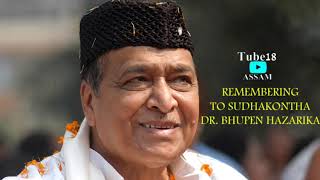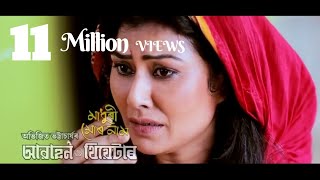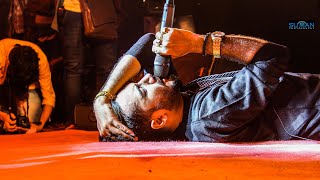Friday, 16 January, 2026г.
















Где искать: по сайтам Запорожской области, статьи, видео ролики
пример: покупка автомобиля в Запорожье
A tribute to Bhupen Hazarika HD || Tube18 Assam Remembering Him To his death anniversary
Bhupen Hazarika (8 September 1926 - 5 November 2011) was an Indian playback singer, lyricist, musician, singer, poet and film-maker from Assam, widely known as Sudhakantha. His songs, written and sung mainly in the Assamese language by himself, are marked by humanity and universal brotherhood and have been translated and sung in many languages, most notably in Bengali and Hindi. His songs, based on the themes of communal amity, universal justice and empathy, have become popular among the people of Assam, besides West Bengal and Bangladesh. He is also acknowledged to have introduced the culture and folk music of Assam and Northeast India to Hindi cinema at the national level. He received the National Film Award for Best Music Direction in 1975. Recipient of Sangeet Natak Akademi Award (1987), Padmashri (1977), and Padmabhushan (2001),[2] Hazarika was awarded with Dada Saheb Phalke Award (1992), India's highest award in cinema, by the Government of India and Sangeet Natak Akademi Fellowship (2008), the highest award of the Sangeet Natak Akademi, India's The National Academy forgu Music, Dance and Drama. He was posthumously awarded the Padma Vibhushan, India's second-highest civilian award, in 2012.[3] Hazarika also held the position of the Chairman of the Sangeet Natak Akademi from December 1998 to December 2003.[4]
As a singer, Hazarika was known for his baritone voice and diction; as a lyricist, he was known for poetic compositions and parables which touched on themes ranging from romance to social and political commentary; and as a composer, for his use of folk music.[26] In a poll conducted in Bangladesh, his song, Manush Manusher Jonno (Humans are for humanity)' was chosen to be the second most favourite number after the National anthem of Bangladesh.[27] Some of his most famous compositions were adaptations of American Black Spiritual that he had learned from Paul Robeson, whom he had befriended during his years in New York City in the early 1950s.[28] His famous song "Bistirno Parore" is heavily influenced by Ol' Man River sung by Paul Robeson.
During his lifetime, a full length docu-feature biopic film on his life titled Moi Eti Zazabor('I am a Wanderer') jointly directed by Late Waesqurni Bora and Arnab Jan Deka was launched in 1986 at his Nizarapar residence in Guwahati city. Music for this biopic film has been scored by 5-time International Best Music Awards winner only Assamese musician, songwriter, composer and singer Jim Ankan Deka, who also worked as Chief Assistant Director of this film.[29] During the next two decades, the joint directors Late Bora and Deka shot him live for the film during his various public performances all over India, as well as many private moments in his domestic and social life. Arnab Jan Deka also extensively interviewed him regarding his life and its creative aspects for the film, which had been recorded during their joint travel to different metropolises and remote corners of Assam and rest of India. The film has been under production since 1986 with film negative footage of more than 16 hours currently preserved in different film laboratories in Bombay(Mumbai), Calcutta(Kolkata) and Madras(Chennai). The film was targeted for public release during the lifetime of Dr Bhupen Hazarika in 2008. But, the production was halted after sudden demise of one of the Co-Directors Waesqurni Bora in November 2008. Eventually, after the death of Dr Hazarika, the film's subject, the surviving Co-Director Arnab Jan Deka is currently carrying out necessary works to finish the film at the earliest and release for public consumption in several language versions including English, Assamese, Bengali and Hindi, with support from Late Waesqurni Bora's widowed wife Nazma Begum and Dr Hazarika's bereaved family members including his wife Priyam Hazarika and Tej Hazarika. Meanwhile, two books describing the unforgettable experiences of the making of this milestone biopic film had been authored by its co-director Arnab Jan Deka titled Anya Ek Zazabor and Mor Sinaki Bhupenda, first of which had been officially released in February 1993 by Late G P Sippy, then President of Film Federation of India and producer of world-record holder Hindi film Sholay at a public function organised by Dr Bhupen Hazarika himself.
Death
Hazarika was hospitalized in the Kokilaben Dhirubhai Ambani Hospital and Medical Research Institute in Mumbai in 2011.[19][20] He was admitted to the intensive care unit on 30 June 2011. He died of multi-organ failure on 5 November 2011.[21][22][23] His body lay in state at Judges Field in Guwahati and cremated on 9 November 2011 near the Brahmaputra river in a plot of land donated by Gauhati University. His funeral was attended by an estimated half a million people.[24][25]
Теги:
Luitor Saporit Bhupen Hazarika Dr Bhupen Hazarika Assamese Old Song Parvati Prasad Baruva zubeen bhupeen Deuka zubeen deuka zubeen zubeen garg zubeen song zubeen new song zubeen garg song zubeen assamese song zubeen garg new song zubeen garg all song zubeen all song zubeen collection zubeen da zubeen dj zubeen da new song zubeen da song zubeen hit song zubeen garg assamese poem zubeen da rock zdr
Похожие видео
Мой аккаунт


 У вашего броузера проблема в совместимости с HTML5
У вашего броузера проблема в совместимости с HTML5


